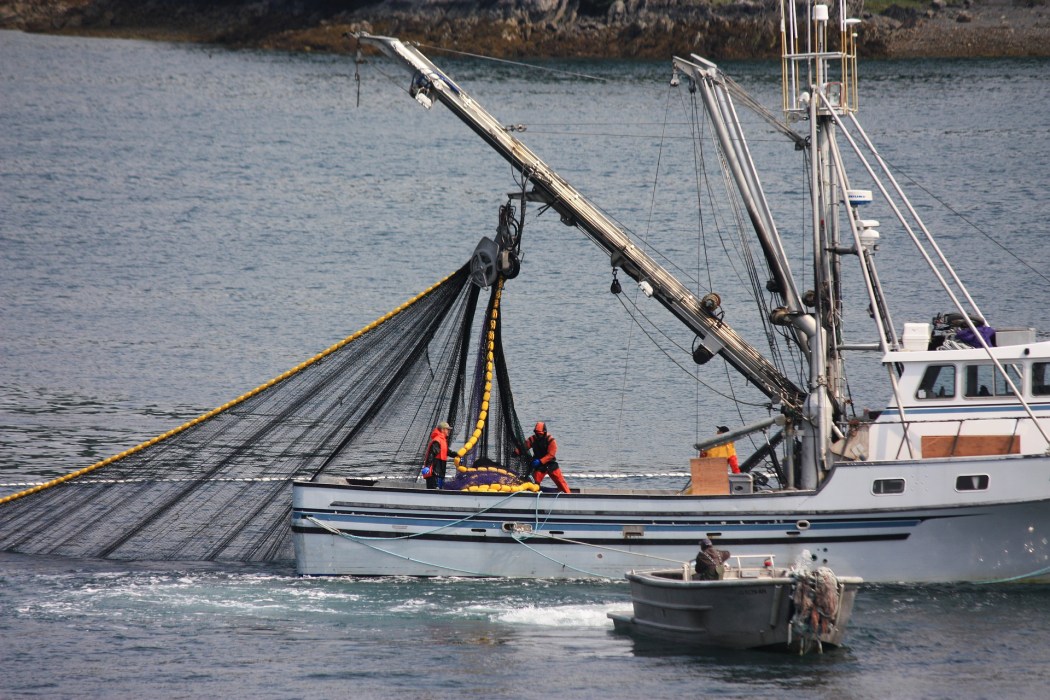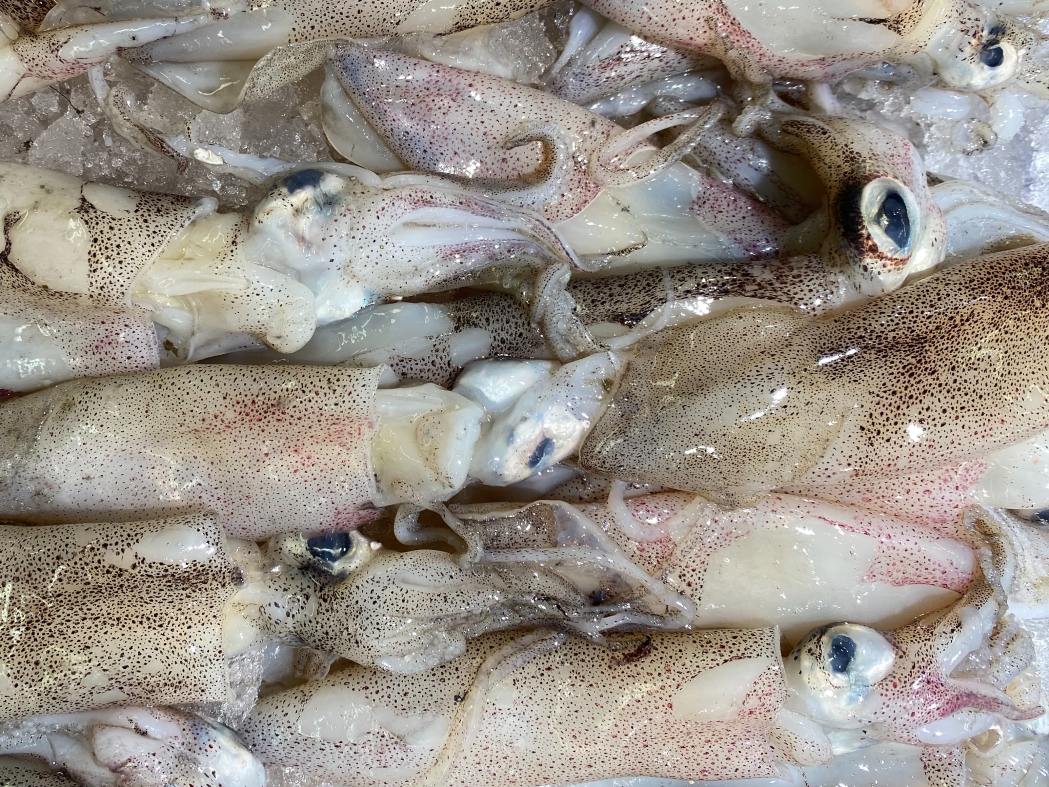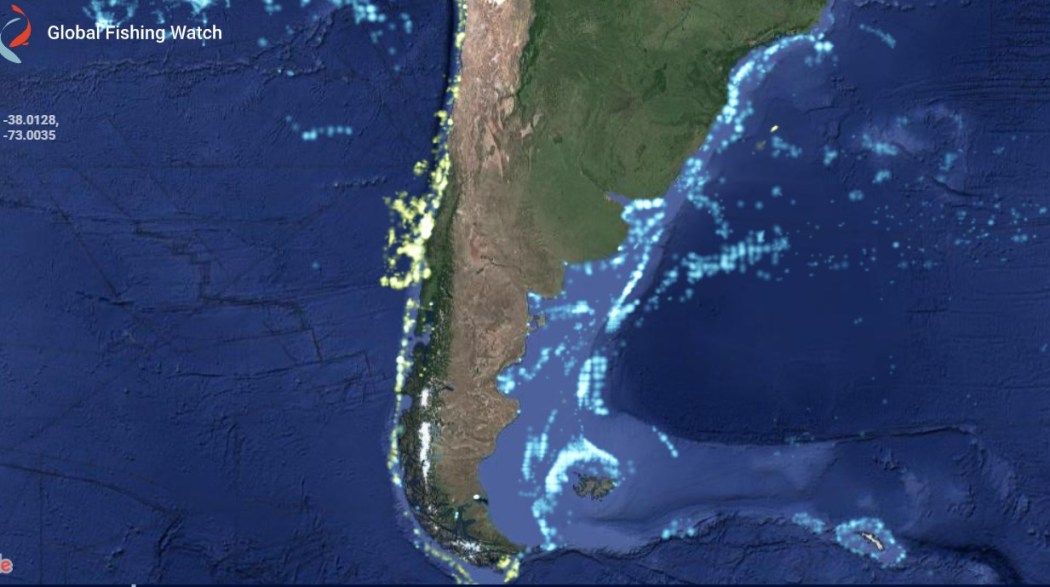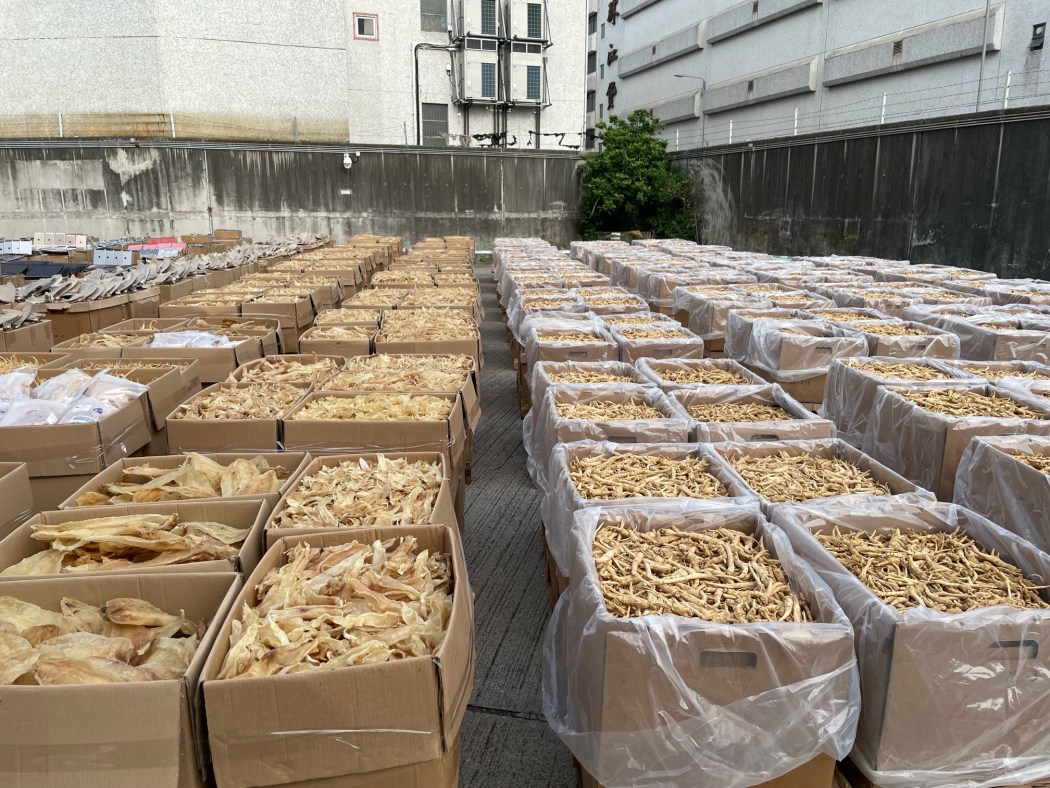The rise of China over the last several decades has been accompanied by adverse impacts on the global environment, ranging from plastic pollution and destruction of the world’s forests to emissions of climate-changing greenhouse gases. The world’s fisheries have also suffered the effects of China’s rise.
Those fisheries are in crisis. According to the United Nations, almost 90 percent of marine fish stocks are “fully exploited, overexploited or depleted.” The global fish catch has been declining since the 1980s, coinciding with a rapid growth in China’s distant-water fishing fleet. That fleet devastates marine ecosystems, harms poor countries and creates insecurity.

One-third of global fish consumption can be attributed to China. At about 38 kilograms, its per capita annual consumption is relatively high by world standards – many times that of most developing countries and far above many major developed countries, including the United States. At over 70 kilograms, Hong Kong’s annual consumption per person is among the highest in the world (nearly triple that of the United States).
Almost 40 percent of wild-caught fish used by China are imported. Two-thirds of Hong Kong’s fish consumption, including of threatened species, come from imports.
China’s fisheries production increased substantially starting in the 1970s and then extensively in the 1990s. Today, China is by far the largest “consumer of life in the ocean,” the world’s largest producer and exporter of fish, and the third-largest importer.
It is difficult to ascertain the precise quantity of fish caught by Chinese vessels. Official statistics over-report the domestic catch, likely so that officials can claim to have achieved production objectives, and “substantially under-report” the distant-water catch, probably to avoid exceeding quotas agreed with foreign governments. Nevertheless, it is clear that China catches more fish than any other country, probably at least 15 percent of the global total, double the take of the two countries with the next biggest catches. For some species, China’s take is far higher. For example, it is responsible for nearly 70 percent of the global catch of squid.

China’s inland and near-shore fisheries have been in decline for decades. Wetland fisheries have been destroyed by pollution, land filling and dams. Coastal fisheries have been degraded by relentless overfishing, pollution from municipal and industrial waste, and runoff from agriculture that periodically creates toxic algal blooms and vast marine dead zones.
The coastal waters of China and those of the South China Sea have experienced reductions in total fish biomass of 90 percent since the 1960s. Measures by the Chinese government to preserve the viability of its national fisheries, such as months-long summer fishing moratoriums, have largely failed to reduce the extreme impacts of overfishing. Those impacts include “disappearance of numerous species from catches, the ‘miniaturisation’ of those remaining, and the fact that an increasing fraction of the catch is unfit for human consumption.” The latter is still valuable in China because it can be used as feed for the country’s huge aquaculture industry.
By the 1980s, widespread devastation of China’s national fisheries prompted the government to push fishers to set sail for far-off waters. China’s distant-water fleet has ventured to all seven seas, and the waters of more than 90 countries, fishing a far larger area than any other country’s fleet. The Chinese fleet comprises up to 17,000 vessels, up from only 13 in 1985 and more than five times the official cap on vessels set by the Chinese government. (For comparison, the American distant-water fleet comprises less than 300 vessels.)

The Chinese government promotes overfishing around the world by helping to pay for the building of large long-range trawlers, providing fleets with forecasts of where and when certain species are most prevalent around the world, and providing tax exemptions and extensive subsidies, notably for fuel. The latter increased by ten times in the five years up to 2011, when the government stopped releasing statistics, thereby making its promises to reduce those subsidies difficult to assess. The government also supports the fleet through the construction of port bases around the world as part of its Belt and Road Initiative.
It is quite well known that China’s demand for shark fins – many of which are trafficked through Hong Kong – has devastated shark populations around the world. Less well known are the impacts on other species arising from China’s demand for fish. According to one assessment, “no major global fishery ecosystem is untouched by China’s seafood economy.”

For example, the totoaba, which is found in Mexico’s Sea of Cortez, is critically endangered due to Chinese demand for its swim bladder – also trafficked through Hong Kong – which supposedly has qualities in Chinese traditional medicine. The bladder of a single fish can sell in China for as much as US$100,000. Tragically, the netting of totoaba leads to the drowning of vaquita porpoises, which are very rapidly nearing extinction (as few has half a dozen of them remain in existence).
Many of China’s distant-water vessels are bottom trawlers, which are banned in China’s own waters due to the environmental devastation caused as they drag their nets across the seafloor. Chinese vessels – including from Hong Kong, where trawling is outlawed – are responsible for more than a quarter of all fish taken globally by this highly destructive method.
Other Chinese vessels undertake destructive practices higher in the water column. For example, long-liners catch tuna and sharks, but in the process also inadvertently catch seabirds and marine mammals. Much of China’s squid catch is taken unlawfully using methods that are wasteful and harmful to the environment, including taking many species that are not the fishers’ targets and which are frequently dumped overboard dead.
China’s overseas fishing fleet is especially destructive because it includes many super-sized vessels that can scour vast areas of ocean, quickly transferring their catches to “factory ships” before scouring yet more of the depths.
China has undermined other countries’ efforts to preserve fisheries. For example, when the Japanese government sought to protect tuna stocks by decommissioning vessels, many of them were bought by Chinese fishers who used them to catch more tuna.
China is notorious for being the worst perpetrator of illegal, unreported and unregulated fishing, notably off Africa and South America. At least ten percent of the Chinese distant-water fleet has been assessed to be involved in such activity, although the real percentage may be several times this figure. According to Spyglass, a database of fishing crimes, more than one in five fishing offenses globally from 2010 to 2019 were committed by Chinese vessels.

In waters off North Korea, Chinese boats have been found to be carrying out the “largest known case of illegal fishing perpetrated by a single industrial fleet operating in another nation’s waters.” Chinese vessels have been detected fishing illegally for bluefin tuna as far away as the Mediterranean Sea.
Disputes with Chinese fishing vessels operating illegally in other countries waters, including those of Indonesia, Japan, North and South Korea, and Vietnam, sometimes lead to arrests of Chinese fishers, who are infamous for fighting back to the point where coast guard members of other countries have died. In the western Pacific, “the Chinese fleet has a fearsome reputation for systemic illegal fishing and aggressive tactics when faced with competitors or foreign patrol vessels.” On one occasion, a coast guard ship from South Korea was sunk after being rammed by a Chinese vessel.
Illegal fishing is recognised as a global problem. Seventy countries have joined the agreement on Port State Measures to Prevent, Deter and Eliminate Illegal, Unreported and Unregulated Fishing. China is not among them.
China’s distant-water fleet frequently operates in the territorial waters of poor countries, decimating fisheries that local people depend on for nutrition and livelihoods. When it comes to taking fish that poor countries rely on for their wellbeing, “China stands alone as the major predator.” Those countries have little ability to stop what is happening because they lack the resources needed to police their maritime jurisdictions.
The harmful impacts of the Chinese fleet on developing countries is especially evident off West Africa, where it often comprises the plurality, and sometimes the majority, of vessels, and where even the vast majority of locally registered vessels can be owned by Chinese front companies. (Nearly 1,000 Chinese distant-water vessels are registered in other countries, half of them in Africa.) China’s West African fleet often operates outside licensed waters, exceeds allowed quotas and under-reports its catch.
Pacific Island countries frequently complain about Chinese fishing vessels operating in their waters. When Chinese companies are permitted to fish there, they are often found to be acting illegally by taking protected species (such as sharks), using unapproved methods (such as long-lining) or exceeding allowed catches. For many of these countries, patrolling their fisheries is all but impossible due to vast areas that need to be covered by under-resourced coast guards.
Oftentimes, Chinese fishers actively seek to avoid detection. In 2020, several hundred Chinese fishing vessels were found taking huge numbers of sharks from waters near the Galapagos Islands. They were operating with their identity transponders deactivated to evade detection.
According to one study, fisheries-access agreements that China has signed with many developing countries “on the whole, have led to unsustainable use of fisheries resources and have negatively impacted the socioeconomic development of host countries.”
In addition to hoovering up fish, China’s distant-water fishing fleet has been used for the country’s territorial and military expansion. According to Tabitha Mallory at the University of Washington, China “has geopolitical motivations for wanting a global fishing presence. China’s strength as a fishing nation contributes to China’s global sea power, which gives China more influence in the international system.”
Chinese fishers serve as a “maritime militia,” with China acknowledging that its distant-water fishing vessels are “pseudo-military instruments.” Chinese fisherman are given “basic military training” and education in “safeguarding Chinese sovereignty.” Armed fishing boats are often used to harass vessels from other countries’ and to assert China’s claims of sovereignty over disputed waters, such as around the Diaoyu/Senkaku Islands. They also serve as mobile surveillance stations for the Chinese military.
This is especially evident in the South China Sea, where both the China Coast Guard and fishing vessels have forcefully defended China’s vast territorial claims. Disputes with fishers from other countries that claim parts of the South China Sea, such as Indonesia and the Philippines, are relatively common. Chinese fishing vessels, sometimes numbering in the hundreds, have occupied disputed waters, especially off the Philippines, despite China’s assertions of sovereignty being rejected by the international court of arbitration.
This has left most of the South China Sea open to exploitation by the Chinese fishing fleet, including the harvesting of pelagic and reef fish as well as sea cucumbers and giant clams, leading to devastating consequences at all levels of the marine food chain. Chinese vessels have even “mined” the coral reefs themselves, destroying essential habitats for all manner of marine species, to facilitate the construction of fortified artificial islands.
In China, fish from the South China Sea are considered to be “patriotic fish,” with their cultivation being viewed by some as akin to “safeguarding national sovereignty.”
In Pacific Island countries, there is concern that China may use apparently innocent outposts, such as radar stations, ostensibly meant to oversee Chinese fishing vessels operating there, as de facto military bases. This concern seems justified given that Chinese defence companies approach governments to establish these facilities but insist that they be staffed by technicians from China.
To meet its growing demand for seafood, China is likely to increase its imports and may increase the size of its already gargantuan distant-water fishing fleet. To be sure, China is not alone in the practice of scouring the world’s oceans for fish. But the size and reach of its global fleet, and the scale of its demand and consumption, mean that the future of the world’s fisheries – not to mention the very survival of some marine species – will be decided by China. Beijing seems to be aware of this. Chinese officials have paid lip service to global and regional fisheries management agreements and made promises to restrain overseas operations, but its distant-water fleet is largely uncontrolled.
According to Zhang Hongzhou at Nanyang Technological University in Singapore, for the leaders of China “ensuring a steady supply of aquatic products is not just about good economics but social stability and political legitimacy.” Sadly, the price of stability in China comes with environmental destruction and instability in other countries.
China’s ability to catch more fish is further evidence that its rapid rise, while good for many Chinese, frequently leaves the human and non-human worlds worse off. For those who eat at Hong Kong’s fabled seafood restaurants, that’s food for thought.
Support HKFP | Policies & Ethics | Error/typo? | Contact Us | Newsletter | Transparency & Annual Report | Apps
| HKFP is an impartial platform & does not necessarily share the views of opinion writers or advertisers. HKFP presents a diversity of views & regularly invites figures across the political spectrum to write for us. Press freedom is guaranteed under the Basic Law, security law, Bill of Rights and Chinese constitution. Opinion pieces aim to point out errors or defects in the government, law or policies, or aim to suggest ideas or alterations via legal means without an intention of hatred, discontent or hostility against the authorities or other communities. |
Help safeguard press freedom & keep HKFP free for all readers by supporting our team

More HKFP OPINION:
HKFP has an impartial stance, transparent funding, and balanced coverage guided by an Ethics Code and Corrections Policy.
Support press freedom & help us surpass 1,000 monthly Patrons: 100% independent, governed by an ethics code & not-for-profit.










